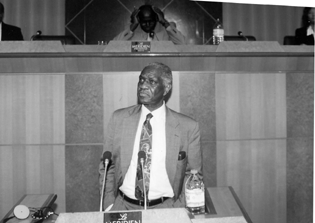Personal tools
News from ICTP 91 - Commentary

Last October, ICTP celebrated its 35th anniversary. Thomas Odhiambo recently spoke about Salam's vision at the Third World Academy of Sciences' 7th General Conference in Senegal, where he received the 1999 Abdus Salam Medal for Science and Technology.
Honouring Salam
The International Centre for Theoretical Physics (ICTP) and the Third World Academy of Sciences (TWAS) are monuments to the institution-building genius of Abdus Salam. One of the great minds of international science in the 20th century, Salam still made time to mobilise his entrepreneurial spirit to construct bridges across the chasms of centuries-old isolation that have kept developing countries from sharing and comparing knowledge and ideas, which is the essence of science.
In September 1962, at the annual General Conference of the International Atomic Energy Agency (IAEA), Salam made an impassioned plea for the creation of the ICTP, which he had proposed two years earlier. It was a brilliant move to suggest that theoretical physics should be the central theme of the new Centre, which was expected to attract the most talented scientists from the South to work closely with world-renowned physicists from the international community on scientific problems of first-order interest.
Why did Salam choose theoretical physics? Listen to him speak to conference delegates at IAEA in 1962:
First, no costly apparatus is needed. Second, individual initiative, rather than collaborative effort, can still lead to a breakthrough. Almost invariably, theoretical physics is the first science in smaller countries which gets developed at the advanced level. History bears this out. This was the case in Japan; this was the case in India; this is happening now in Brazil, Turkey, Lebanon and Argentina. No one can reverse the historical process of the order in which science grows in rich or poor soils. But in spite of the ambitions of these scientists, theysuffer from one fatal disability--isolation. After an initial period of brilliant work, they are faced with a cruel choice: either leave their countries or ossify and become scientific administrators.
The ICTP, thanks to Salam's tireless efforts, was established in October 1964. Within the very first year of its existence, the Centre was flourishing. The ICTP's success gave Salam an opportunity to frequently reflect on what made the institution function so magnificently and what was required to allow it to continue to glow brightly in the firmament of world science. In October 1979, some 15 years after ICTP's founding, and four days after he was awarded the Nobel Prize in Physics, Salam addressed the Executive Board of the United Nations Educational, Cultural and Scientific Organization (UNESCO). He took advantage of the occasion to urge oil-rich Arab countries to use part of their new-found wealth to fund excellence in science, as their progenitors had done at the beginning of the second millennium:
To some of you, Allah has given a bounty and income of the order of US$60 billion. On the international norms, these countries should be spending US$1 billion on science and technology. It was their forebearers who were the torch bearers of scientific research in the eighth, ninth, tenth and eleventh centuries. It was their forebearers who started the academies of sciences in Baghdad and Cairo. Be generous once again. Spend the billion of dollars on international science, even if others do not. Create a talent fundLet the talent fund be available, not only to Islamic countries, not only to Arab countries, but to all developing countries.
It is this kind of visionary effervescence that has carried some of the countries of the South--for example, Brazil, China, India and South Korea--to near-First World status in science and technology. And it is this kind of future-oriented revolutionary thinking today that is impelling several African leaders to talk about an African Renaissance.
Science-based development was at the heart of Salam's strategy for improving conditions for both scientists and society in the developing world. It's why he is remembered so fondly today and why his ideas have spanned both decades and geographical boundaries. On the occasion of the 35th anniversary of the ICTP, there can be no more fitting tribute to Salam than for developing countries in Africa and elsewhere to embrace policies and programmes that will continue to help turn his vision into a reality.
Thomas Odhiambo

Thomas Odhiambo is honorary president of the African Academy of Sciences and managing trustee for the Research and Development Forum for Science-Led Development in Africa (RANDFORUM), headquartered in Kenya.